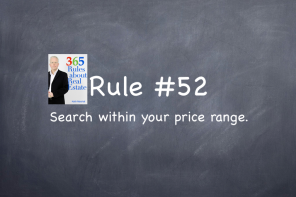How much should I offer on a house?
How much to offer is a question that comes up all the time. Although there is no right answer, there are a number of things to be considered.
- List price
- Market conditions
- Days on market
- Neighbourhood comparables
- Substitute house
- Historical data
- Season and timing
- Seller expectations
- Buyer desire
Let’s look at them one by one
Nine things to consider when making an offer on a house.
1. List price
Your offer vis-a-vis list price has to be high enough to get the attention of the sellers but low enough to give you room to manoeuvre. If your initial bid is high enough, you can usually expect and hope for a counter-offer to your offer and then often a chance to counter-offer that offer. But the first step is making an offer high enough to stimulate the sellers to counter.
In our local market, although there is no formula or percentage successful bid price under list price, experience tells me that 5% under is often enough to get things started.
Interestingly, at higher price ranges the percentages are also higher and at lower price ranges the percentages are lower. That means, in the million dollar market you may be able to offer 7% or maybe even 10% off list price whereas in the below $400,000 market, you may want to start at 3% off.
2. Market conditions
Are you in a Seller’s Market? A Buyer’s Market? Or a Balanced Market? The power shifts accordingly between sellers and buyers.
In terms of what kind of market it is, different neighbourhoods and price ranges can be experiencing different kinds of markets. Don’t rely on the news to tell you what kind of market we are in.
3. Days on market
Most homes in Kitchener-Waterloo currently sell within a month. If a home lingers on the market because of poor pricing or other factors, the seller’s may entertain a “low-ball” offer. Before offering, it is important to try to find out why the home is not selling? Is there something fundamentally wrong with it or has the listing simply had bad luck.
4. Neighbourhood comparables
The list price should never be used as an anchor price for negations. Your offer price should be based on what has recently sold in the neighbourhood. If there haven’t been good comparable sales in this neighbourhood, maybe there are sales in other similar neighbourhoods.
5. Substitute house offer price
If you have a Plan B, a home that is your second best choice, you can base your offer price on the house you really want on the house you are willing to buy. If the homes are similar enough that you would be happy either way, then you can share this information with the selling side.
6. Historical data
Although, what the sellers paid for the house when they bought it is unfortunately irrelevant, other historical data is extremely important. Our real estate board has data going back into the early 1990s on house price ratios, days on market, and many other things. If you are a data nerd, (and who isn’t) mapping some of this data can be fun and useful.
7. Season and timing
It is fascinating to me just how much the price for a home can vary within a short period of a year or even half a year. Home sellers should list their homes when the buyers are buying. They will almost always do better to list in March than to list in December. Smart buyers know this too.
In terms of timing, neighbourhoods often can only sustain so many sales a season. If a home seller sees many sales happening in his neighbourhood, he may be too late to list as the ready buyers for the neighbourhood have already bought.
8. Seller expectations
When making an offer, it is important to keep in mind the seller’s expectations. If the sellers are expecting more than the market price for the home, it is important for your agent to find out why. How did the listing agent set the price? What are his comparables? What is the rational for the high price?
When submitting your offer, you could also include the comparable sales that you are basing your offer on.
9. Offer based partly on ‘buyer desire’
Finally, you have to consider your own desires as a buyer. How badly do you want this house? Is this your only chance to buy into this neighbourhood? Do houses like this come up for sale only once a year? Are you getting tired of shopping? If you wait six months will prices move up beyond your budget? Are you relocating and need to buy soon? You have to look at your own opportunity cost and your ‘buyer desire’.





